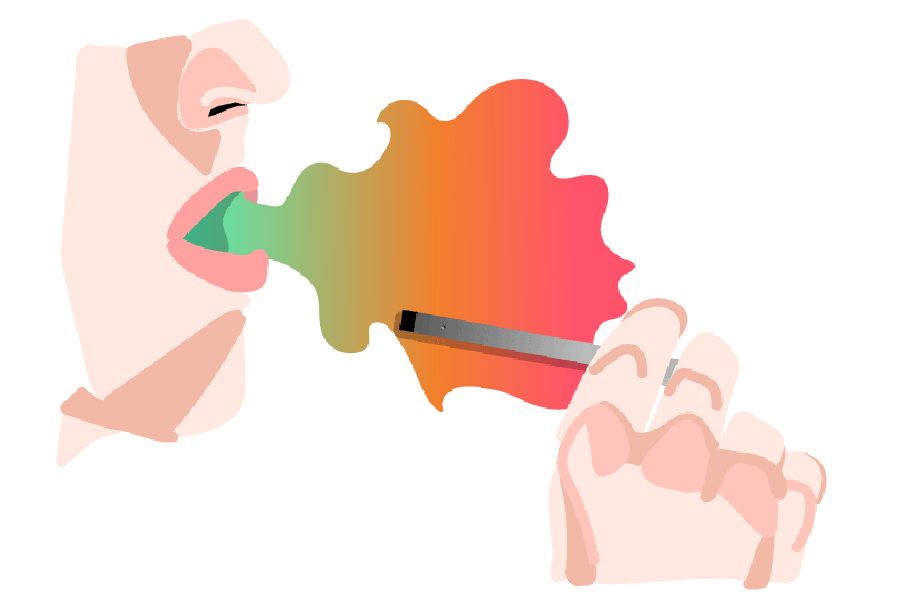Evolution Of The Juul
Credit: Julianne Kirby
November 1, 2018
The nicotine craze isn’t new to the world of high school, but what is different now is the small rectangular “Juul.” The Juul has started a giant, unstoppable trend across high schools and universities in America.
Vapes became relevant in our community around 2 or 3 years ago. Before then, none of us had interest or knowledge of the “vape game.” The Juul brought something appealing to kids in high school, and even those younger than that.
But the habit of vaping in and around our community seems to be changing daily. As soon as one kid decides to put it down (and there seems to be a growing number), another picks it up. It is an endless phenomenon, and people commonly question if or when it will end. Since this craze began at WAHS, more students have tried Juuling, but the level of habitual use or addiction has decreased.
“No, I don’t think people will ever completely stop Juuling, it is too accessible to everyone for people to stop,” says an upperclassmen boy.
One of the reasons it became so popular is the failure to educate students of the risks and effects of what it contains.
Although it is constantly stated that Juuling is in fact bad for you, no one has gone on to tell students exactly how and why. We are told in assemblies, online, and in person. However, evidence and explanation really are the way to get kids to quit who haven’t already quit yet.
Kids easily could have been fooled, as this product was advertised as a way to quit nicotine habits, a subtle buzz to get rid of the craving.
“Juul was created to be a satisfying alternative to cigarettes. Learn about our mission to improve the lives of the world’s one billion adult smokers.” This first statement on Juul’s official website, a statement that sells juuls as a safer alternative to smoking. But in a generation where cigarettes are not as prominent anymore, Juuls are the new nicotine vice.
According to one female student, the confusion around the negative effects of Juuls is that “we are the first generation to have this available to us, and since no one knows the long term effect of this yet, many are left to think there are or will be little to none.”
It’s intriguing to see how this trend changes in a year alone, and how people’s opinions and actions change with it.
When one student (usually an upperclassmen) decides to give up his/her juul, it is immediately given or taken by a kid who will go through the same cycle.
Students’ attitudes about Juuls change with the seasons, literally. As sports seasons come and go, it is common that students will stop or reduce their usage.
“Specifically on game days, many guys on the team won’t juul or when we get super into the real season,” says a junior who is a varsity athlete.
Although students may be putting down their own juuls during the sports seasons, they will still pick up someone else’s if it is offered and/or available to them.
Another reason students are hesitant to start or no longer keep the habit of Juuling up is for monetary reasons. It is hard enough to find work and not to be broke as a teenager, and this expense does not come cheap.
An upperclassmen girl shares this attitude: “I realized it was kinda a waste of money and didn’t like it enough to keep it up.”
A boy expressed similar feelings when asked his opinion on vapes, simply responding with, “Pretty stupid, waste of money.”
In a project for Ms. Green’s PVCC Stats class, four seniors surveyed students about vaping habits. The results of the survey demonstrate that Juul usage goes up by grade. It shows that a high percentage of upperclassmen use Juuls; but if people know the student body, they can infer what that data actually means.
As expected, the usage of Juuls or other vapes increases by grade. However, there is another likely explanation: that as you get older, the probability that you’ve you’ve tried Juuling even once goes up.
But what is more significant is that younger kids who are starting to juul use their energy to seek out nicotine and a way to get it. While it is not wrong to say that more students have picked up Juuling, or that many seem to have given it up, it’s clear that students have adopted a casual attitude about a dangerous trend.
















